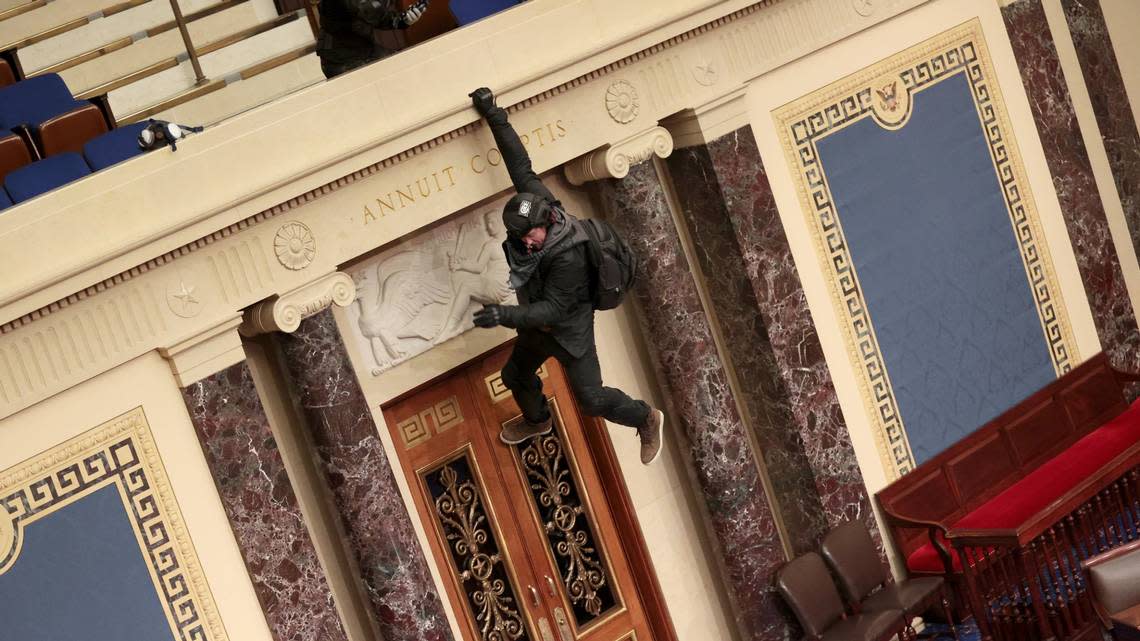Supreme Court rules a charge was misapplied in Jan. 6 cases. Will that affect Idahoans?

- Oops!Something went wrong.Please try again later.
- Oops!Something went wrong.Please try again later.
- Oops!Something went wrong.Please try again later.
The Supreme Court on Friday ruled that a participant in the Jan. 6 Capitol riot should not have been charged with obstruction of an official proceeding — a decision that could affect some Idaho defendants.
It was a 6-3 decision and did not perfectly follow ideological lines, and the majority opinion said the government interpreted the obstruction statute too broadly. Justices Amy Coney Barrett, Sonia Sotomayor and Elena Kagan dissented, according to Supreme Court documents.
“The peaceful transfer of power is a fundamental democratic norm, and those who attempted to disrupt it in this way inflicted a deep wound on this Nation,” Justice Ketanji Brown Jackson wrote in a concurring opinion. “But today’s case is not about the immorality of those acts. Instead the question before this Court is far narrower.”
Chief Justice John Roberts wrote in the majority opinion that the Justice Department’s interpretation would “criminalize a broad swath of prosaic conduct, exposing activists and lobbyists alike to decades in prison.”
Seven people with ties to Idaho were charged with crimes after a group of Donald Trump supporters stormed the Capitol on Jan. 6, 2021, the day that President Joe Biden’s victory in the 2020 election was being certified: Theo Hanson, Josiah Colt, Michael Pope, Yvonne St Cyr, Duke Wilson, Pamela Hemphill and Tyler Tew.
Hanson and Pope were charged with obstruction, among other crimes, according to Department of Justice documents and previous Statesman reporting. Colt and Wilson pleaded guilty to the charge of obstruction. Wilson also pleaded guilty to assaulting, resisting or impeding certain officers or employees.
The U.S. Attorney’s Office for the District of Idaho referred the Statesman to the U.S. Attorney’s Office in Washington D.C., which prosecuted the cases. That office referred the Statesman to a statement from Attorney General Merrick Garland.
None of the 1,400 Jan. 6 defendants were charged solely with obstruction, according to that statement.
Typically when people plead guilty via a plea agreement, they waive their right to an appeal, other than having ineffective counsel, said Wendy Olson, a former U.S. attorney in Idaho.
“But sometimes in the past, when the Supreme Court has reversed a statute, they say it has retroactive application,” Olson said. “I’m sure all of that will play out here.”
The ruling means that the case of Joseph Fischer, a former police officer, returns to lower courts, and it could affect other defendants who might seek to challenge obstruction convictions.
Defendants were either not charged or never convicted of obstruction in 82% of the Jan. 6 cases, according to the United States Attorney’s Office. The Supreme Court’s decision will have no impact on those cases, according to the Justice Department.
“I don’t think it’s the death knell for the Jan. 6 prosecutions,” Olson said.

